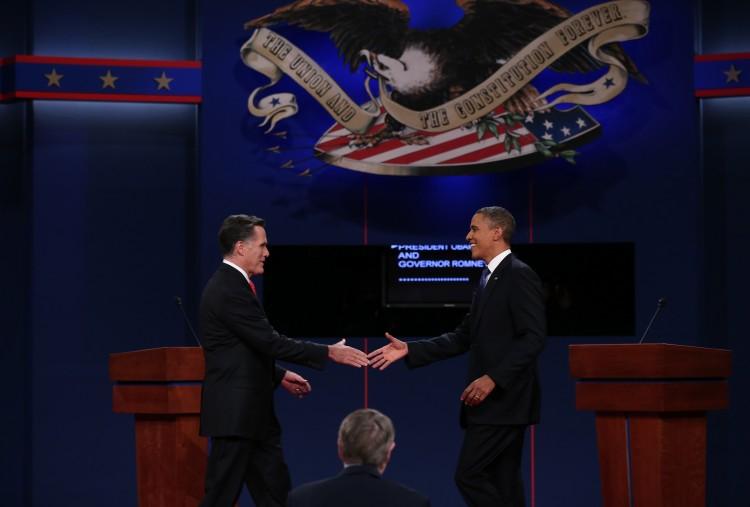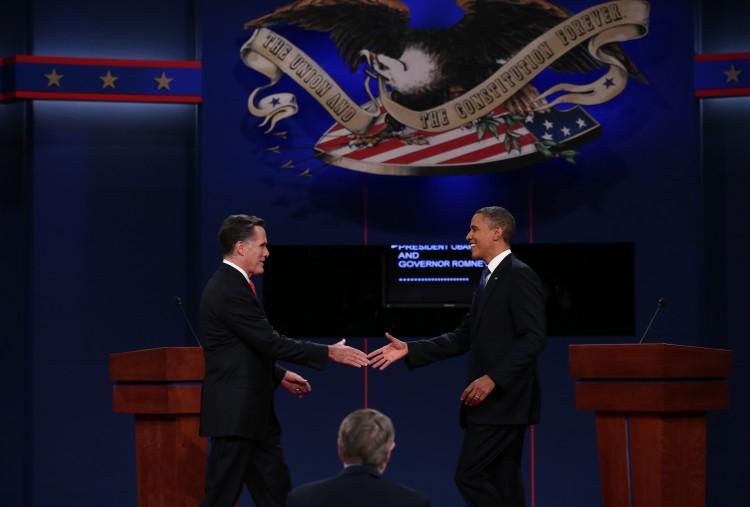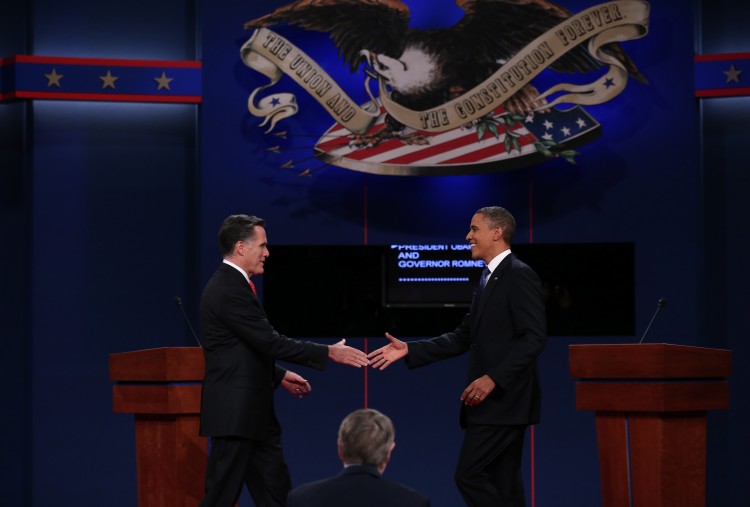In what has been described as a pivotal moment in the election, President Barack Obama and his Republican challenger Mitt Romney faced off in their first presidential debate on Wednesday night in Denver, five weeks before voters will cast their ballots.
For those searching for zingers and uppercuts, there were few. The two candidates maneuvered around a sprawling heap of topics, but mainly focused on the economy—a key election provision, and one that has nagged Obama’s administration.
Dr. Kathleen Kendall, research communications professor at the University of Maryland, said both candidates were effective in stating their positions, “fully and specifically.”
“They both succeeded in appearing knowledgeable and concerned about the American people, and concerned about improving the economy and improving healthcare and cutting the deficit,” she said.
Dr. John Hudak, a fellow in Governance Studies at the Brookings Institution, said Romney gave a robust performance.
“He took control early on. He had really solid answers to very difficult questions, something he needed to do to stay alive in the presidential race.”
Although Obama seemed hesitant at first, Hudak said the president gained his stride as the debate progressed.
“By the end of debate, the president was finding his groove, hitting the right talking points, making the right distinctions between his ideas and Romney’s,” he said.
Taking a Stand
The debate allowed millions of Americans to compare the two candidates’ policies on a national platform. It has been speculated that the first debate was Romney’s chance to make a comeback after recent struggles in the polls in key battleground states.
Romney’s campaign platform has primarily revolved around job creation. Romney criticized Obama’s economic plan, saying Obama is campaigning on the same economic platform that won him the election four years ago, stressing that it did not work.
“I’m concerned that we’re on the path that’s just been unsuccessful,” he said. “The president has a view very similar to the one he had when he ran for office four years ago—that spending more, taxing more, regulating more, if you will, trickle-down government, would work. That’s not the right answer for America.”
The president shot back saying Romney’s economic plan is the “same sales pitch” that led to the current economic crisis. Obama said his economic plan is closer to former President Bill Clinton’s, which brought the United Stated from “deficit to surplus.”
“We’ve begun to fight our way back,” Obama said. “We’ve still got a lot of work to do.”
With the two wars in Iraq and Afghanistan winding down, Obama said he would dedicate some of that money to programs that would strengthen the U.S. economy, such as investments in energy and education.
Obama suggested, “a new economic patriotism that says America does best when the middle class does best.”
Obama accused Romney of having a $5 trillion tax cut in his plan, which Romney repeatedly denied. “That’s not my plan,” he stressed. “My priority is putting people back to work in this country,” he said.
Obama responded that over the past 18 months, Romney has campaigned on the tax cut and that now “his big bold idea is, ‘never mind.’”
After a long debate on jobs, the two candidates sparred over how to tackle the mounting U.S. deficit and balance the budget. Romney said he does not want the United States to mirror Spain’s current financial situation: “You never balance the budget by raising taxes,” he said.
Romney said he would reduce the deficit by ending Obama’s health care plan and cutting funding to other government programs, like the Public Broadcasting Service (PBS). Later, Romney also said the government needs to save Medicare for the long-term.
“I can’t understand how you can cut Medicare ... for current recipients. I want to take that $716 billion you cut and put it back in Medicare,” Romney told the president, adding that he would provide more assistance to small businesses.
Obama responded saying that Romney’s plan would essentially turn Medicare into a voucher program. “If you’re 54 or 55, you might want to listen,” he said.
The candidates did agree in several areas. Both want to improve education in the United States and neither proposed changes to Social Security. They also agreed that the corporate tax rate is too high.
In recent weeks, Romney has been on the defensive and was looking to turn his campaign around after struggling in the polls in several battleground states. But Obama also faces issues of his own, especially with the country’s economy still mired in a recession.
Romney has had a difficult time of convincing some voters that he has a vision to restore the country’s economy. A recent, secretly recorded video released three weeks ago likely had a negative effect on his image.
The two candidates will face each other two more times before the Nov. 6 election. Vice President Joe Biden will also hold one debate with Romney’s running mate, Paul Ryan.
The Epoch Times publishes in 35 countries and in 19 languages. Subscribe to our e-newsletter.






